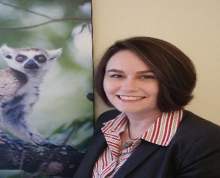Spotlight on Peer Support Workers
Highlighted below are some of the ways peers from around the country have incorporated their lived expertise into their SOAR work.
Peer Spotlights
Check out these profiles of Kristy Anderson, retired SOAR representative from Albuquerque, New Mexico; Jess Soucy, SOAR Outreach Case Worker from Evansville, Indiana; Maureen Ryan-Murphy, Former Peer Recovery Specialist from Roanoke, Virginia; and Veronica Delgado, Certified Peer Worker in Las Cruces, New Mexico.
Kristy Anderson, Albuquerque, New Mexico
- What kind of work do you do? How does SOAR fit into your role?
I just retired from working as a SOAR representative 15 to 20 hours a week. I was a subcontractor working with Teddi Rivera who contracts with Heading Home to serve their clients. - What drew you to this area of work?
I have worked with [people experiencing homelessness] since 2000. Before certifying as a SOAR representative, I worked for Heading Home as a Program Manager. - How has your lived experience helped you in your SOAR work?
For 22 years I was a contract writer and editor in the medical field. I was a plain language/health literacy writer and editor who made complicated medical information easier to read for adults reading at an 8th grade level or less. I started doing that work because I saw how hard it was for indigent populations to understand the information they needed to know to be safe, well, and prosper—because the information was written at too high a reading level for the average reader. For a few years I worked at hospitals doing health literacy work, and many of the people we served were [experiencing homelessness] or housed and [living in poverty]—and struggled to access the services they needed and were entitled to. That included SSI and SSDI benefits. - Are there SOAR success stories or anything you’re super proud of?
Yesterday Teddi called me to say one of my clients was approved for SSI. She called because she thought I would like to be the one who let him know he had been approved. It made my day to tell him the good news. He was a client I had 2 years ago. It took me a year and two appeals to get him approved. After he got housed, he got custody of his teenage son, and they were going to apply for benefits for him as well. - Do you have words of wisdom, advice, or recommendations for peers looking to do SOAR work or get SOAR certified?
Don’t let the online training discourage you from finishing. It’s arduous, but don’t give up. Being a SOAR representative is intense work, but it’s worth every minute of your time to help people navigate the process.
Jess Soucy, Evansville, Indiana

- What kind of work do you do? How does SOAR fit into your role? I am a SOAR Outreach Case Manager at Aurora to assist clients who meet Category 1 homelessness (street or shelter) by applying for Social Security benefits using the SOAR model. In addition, I’m on the Outreach Team, helping clients daily in shelters and on the street to overcome barriers and accomplish goals to obtain housing.
- What drew you to this area of work (SOAR, housing/homeless services, peer advocacy, benefits etc.)? Helping the homeless just comes natural to me and is dear to my heart. I was homeless myself; I’ve slept outside under a tree and I lived in a shelter 5 years ago, so I understand what the struggle and hardship is to be homeless. As a case manager, I can’t see myself doing anything different.
- How has your lived experience helped you in your SOAR work? While living in the shelter, I tried to work, but with my struggle with mental health issues from a long history of trauma and because I am legally blind, I was approved for Social Security benefits. This helps me relate to the individuals in need of benefits and those who struggle with their mental health, and I am thankful for being part of the SOAR family.
- Are there SOAR success stories or anything you’re super proud of? I’ve had clients tell me, “If you can do it, then so can I!” This is encouraging to me because this helps me feel that this works and makes a difference in someone’s life. It is a true blessing to help someone get an income and then help them get housing and help them grow along the way. They thank me, but I thank them for allowing me to help them.
- Any words of wisdom/advice/recommendations for peers looking to do SOAR work or get SOAR certified? I tell my clients that they are the ones doing the hard work. Homelessness takes a toll on the body, mind, and spirit. I encourage my clients to hold on to things that keep their positivity, hope and strength.
Maureen Murphy-Ryan, Roanoke, Virginia

- What kind of work do you do? How does SOAR fit into your role?
I worked a couple different roles at Blueridge Behavioral Healthcare. I worked fulltime as a Warmline Operator for 2 years and was also a Peer Recovery Specialist trainer. While in that role, the opportunity for SOAR training came up, which seemed like an important training to help the peers I served on the warmline. Over time I had come to realize how much a lack of resources and unawareness of the many eligible benefits were limiting people’s recovery. I was able to take two clients through the process and was able to get approvals on both of them, which felt really good. I’m currently a third-year psychiatry student at the University of Washington and would still like to be involved in the SOAR process, most likely as a clinical resource helping with Medical Summary Reports (reviewing them/signing off on them). - What drew you this area of work (SOAR, housing/homeless services, peer advocacy, benefits etc.)? I
’m personally in recovery from a severe alcohol use disorder and I wanted to do something in the field of mental health where I could use my experience in recovery. I already had previous experience in the medical field, so I was attracted to being able to assist people in recovery and use my existing knowledge of the medical system. - How has your lived experience helped you in your SOAR work?
Knowledge of different systems was helpful. I had experienced financial instability as a result of my disorder and had experienced incarceration and inpatient rehab, so I was familiar inside and out with many of the things my clients were going through. It also made it easier for them to trust me because I know how hard this is. I was really successful at being able to maintain those relationships and get people through the process because they trusted me. - Are there any particular SOAR success stories or anything you’re super proud of?
I have a 100 percent success rate with the 2 people that I helped. Obtaining financial stability was essential to their recovery so that they could be stable members of society. I later heard that one of my members has now been able to consistently engage in community programs such, as 12-steps and other community groups. I don’t think they would have been able to do that without SOAR. It truly felt great. It was one of the most exciting moments of my recovery specialist career. - Any words of wisdom/advice/recommendations for peers looking to do SOAR work or get SOAR certified?
The SOAR process can be labor intensive, but it’s worth it. You’ll want to have the full support and understanding from your supervisor about how much work it takes. Having their knowledge of it is essential so that they can best support you as you do the work. As I was going through the course, I explained to them what I was expected to do and what I would need from them. I came into this role with a lot of advantages (writing experience, medical experience, etc.) but not having those things shouldn’t be a barrier to anyone interested in taking the course! That’s where our supervisors can help us!
Veronica Delgado, Las Cruces, New Mexico

- What kind of work do you do? How does SOAR fit into your role?
I currently work as a Certified Peer Support Worker (CPSW) and a Certified CHW Community Healthcare Worker (CHW) for Presbyterian Health Plan, New Mexico. I assist members with their social determinant of health needs, assist members to find community resources and identify the need for SOAR services for at-risk and homeless populations. During COVID, our Presbyterian Healthcare Services SOAR Advocates have been able to assist members across the state of New Mexico by encouraging them to receive services through telehealth and by reaching out to homeless shelters to assist members with their SOAR applications. - What drew you this area of work (SOAR, housing/homeless services, peer advocacy, benefits etc.)?
I found I was able to make a difference by assisting those in need of stable housing and consistent income. Because of my personal experiences, I found people were more comfortable working with a “peer.” Peer support allows members to be more open about their life experiences and accept assistance because they are engaged through a mutual process of support and shared understanding of specific lived experiences. They respond to working as “partners” to address their social and health needs. - How has your lived experience helped you in your SOAR work?
I believe my difficult lived experiences and the challenges I have survived have given me a deeper understanding of others during their challenging times. I remember the feeling of being lost, overwhelmed, and embarrassed to be open with someone who has not lived through a similar experience. As a peer, I feel I can connect with the individual without judgment and earn their trust. - Are there any SOAR success stories or anything you’re super proud of?
I am proud of all my SOAR experiences. Members have been able to get connected to medical and behavioral providers as well get connected with resources for stable housing. Many members improve their current situation after receiving SOAR services. I’m happy to be part of something that improves their quality of life. - Any words of wisdom/advice/recommendations for peers looking to do SOAR work or get SOAR certified?
I have found great job satisfaction by assisting my peers in gaining access to SSI/SSDI benefits through the SOAR process and help them through a rough transition period. I believe getting SOAR certified is a great opportunity for professional growth and a way to gain experience working with government agencies while assisting peers with needed services in a judgment-free setting.
Details
- Type:
- Article
- Date:
- August, 2021
Other Details
- Topic
- Peer Supports

